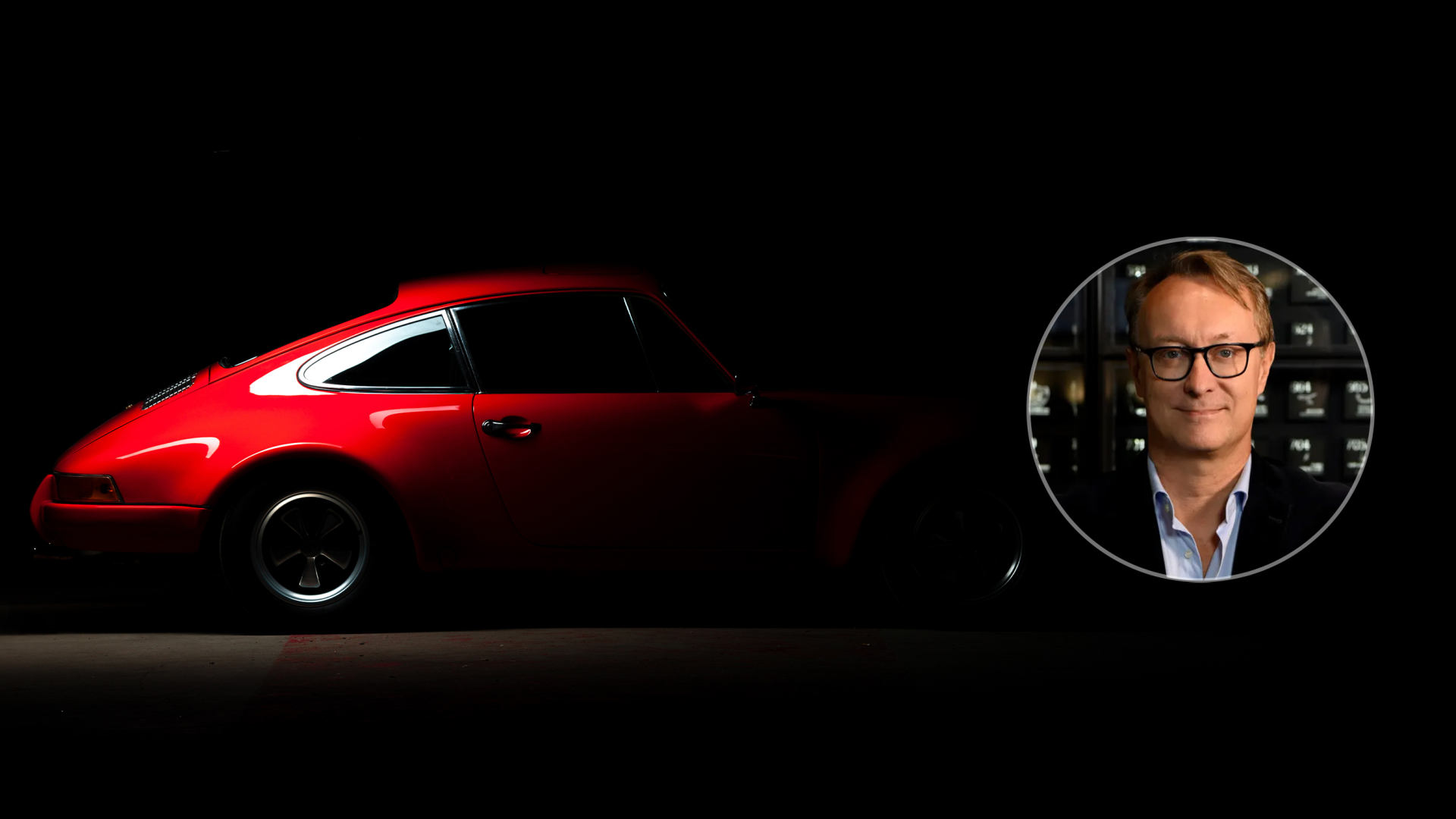
Which watch fan drives which car?

A popular question everyone who has to do with watches professionally asks is: which person wears which watch? Some jewellers believe they know precisely which watch the customer will ask for right from the first impression. But no one wants to be quoted with such findings. That's why we asked the question differently. Which watch type drives which car? There are no statistics on this. These are also purely mind games, nothing more. Nevertheless, we believe that some assumptions are correct.
Guest article by Holger Christmann
Holger Christmann was editor-in-chief of the German watch magazine. He publishes FEATURE, a cultivated luxury magazine with contemporary topics and current affairs from the world of style, watches and culture.

Audemars Piguet Royal Oak and Porsche 911
Anyone who wears a Royal Oak from Audemars Piguet loves the epoch-making design of the first sporty, robust luxury watch in stainless steel. It came onto the market in 1972. Its octagonal bezel was disruptive and exemplary for an entire generation of timepieces. Eight hexagonal screws in the bezel suggested robustness. The tapestry dial added sophistication to the watch. The Royal Oak is a statement. Its owner ensures it peeks out from under the cuff because you buy a Royal Oak to get noticed. Whoever wears this watch also wants to drive a car that attracts the attention of passers-by: a Porsche 911, for example. The 911, designed by Ferdinand Alexander Porsche, is also an icon. It is only a few years older than the Royal Oak. It went into series production in 1964. The nine-eleven is the epitome of a sports car and Porsche's best-known classic - just as the Royal Oak is synonymous with Audemars Piguet. A perfect match, I would say.
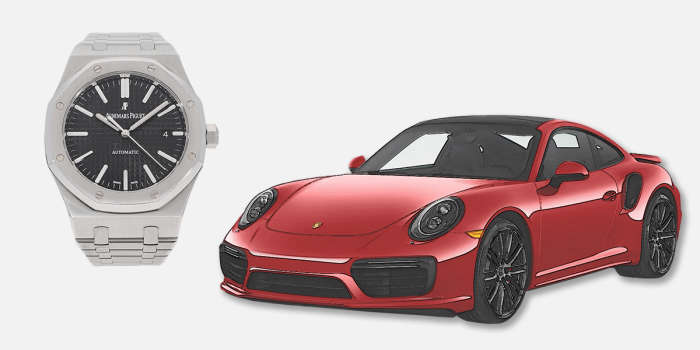
Rolex Oyster Perpetual GMT Master II and BMW X6
Rolex buyers value prestige and high reliability. The cult brand from Geneva offers both in perfection. Those who wear a Rolex want to show their social status, knowing they are also wearing a perfectly made watch that has been tested countless times. For a Rolex watch in stainless steel like the GMT-Master II, buyers are willing to pay large sums of money they have saved (on the other hand, one should already have the sum for a Royal Oak. Otherwise, one should better invest in a condominium).
On the other hand, the Rolex watch is a status symbol that every inhabitant of the earth knows and accepts. As is well known, Rolex is one of the most respected luxury brands in the world. Those who wear a Rolex signal that they have the money to live well. Rolex customers are performers in sociological terms. They belong to the efficiency-oriented and progress-optimistic performance elite, think in global economic terms and are liberal. They believe in personal responsibility and see themselves as style and consumption pioneers.
If you wear a Rolex, you will get appreciative looks and comments. A Rolex watch is, therefore, sexy, the ultimate turn-on. But the car must also match the watch. As a person who loves performance, likes to shine and be the centre of attention, the Rolex buyer chooses a car from a premium manufacturer that not everyone can afford, impresses with high reliability and impressive performance and signals status. The Rolex owner, therefore, fits a BMW X6, the sportiest SUV from the Bavarian premium brand.

IWC Portugieser and Mercedes E-Class
The IWC Portugieser is a classic. It came onto the market in the 1930s, ordered by two importers from the seafaring nation of Portugal, Rodrigues and Antonio Teixeira. They believed that the Portuguese gentleman would like to wear watches in stainless steel in the style of marine chronometers. Among the functions of these navigation watches was the small seconds at 6 o'clock. The first Portugieser, Ref. 325, was huge at 41.5 mm in diameter - sizes of 34 to 36 mm were common at the time. Therefore, the watch initially had to be powered by a pocket watch calibre. The features of the first Portugieser also include Arabic numerals and the railway minute track.
With its modern appeal and classic elegance, the Portugieser collection is one of IWC's most successful models. In 2022, all versions are equipped with manufacture calibres. The wearer of the IWC Portugieser belongs to the conservative, upscale milieu: they stand for classic ethics of responsibility and success and claim exclusivity and status. He wants order and balance and sees himself as a rock in the surf of postmodern arbitrariness.
A car that suits him is a Mercedes E- or S-Class sedan — because Mercedes stands for thoroughly conservative values such as durability, safety and reliability, as well as for smooth running and comfort. The wearer of the IWC Portugieser also wants a life of regularity. At the same time, it is prepared like a Mercedes Benz and well protected from risks.

Breitling Navitimer B01 Chronograph 43 and Ford Mustang
Breitling was once one of the favourite brands of jumbo pilots. In the event of an instrument failure (of course, it never happens), the Navitimer's slide rule bezel can be used to calculate important data such as average speed, climb and descent rates and fuel consumption. In 1952, the Navitimer was launched in conjunction with the Aircraft Owners & Pilots Association (AOPA). Breitling later co-developed the first automatic chronograph. Breitling's chronograph modules are still in high demand today, which is why they also work in Tudor watches. After the new Breitling boss Georges Kern found numerous inspirations from the brand's great past in the archives, Breitling is now more sophisticated than ever before. The traditionalists among Breitling fans, in particular, love the brand for its masculine touch.
Maybe they have a family and drive a VW Passat Variant but long for weekend drives in a self-restored Ford Mustang - a car that sounds like freedom, adventure, masculinity and a road trip on Route 66. It makes them dream of the good old days when men were real guys like Burt Reynolds and "Easy-Rider" Dennis Hopper.

Cartier Tank and Jaguar F-Type
The Cartier wearer is a gentleman. He loves elegance, the fine parquet and cultural refinement. He may also have a penchant for beautiful felines, like the panther Cartier's emblem. He is an individualist. Therefore, he does not want to wear a watch that corresponds to mass taste, nor does he want to drive a car like the ones you see too often on the streets. Tradition and extravagance are important to him. And Cartier, with its customer pedigree of film stars, fashion icons and maharajas, leaves nothing to be desired. Something slightly extravagant like a Jaguar F-Type - the successor to the E-Type - suits Cartier Tank owners. Jaguar stands for racy sports cars and - like Cartier - for great history and unsurpassable design expertise.
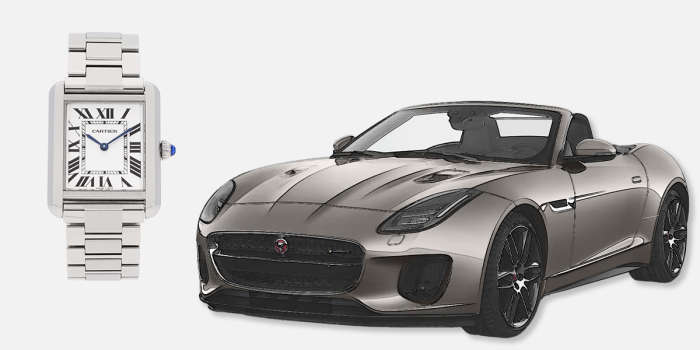
Nomos Glashütte Tangente Neomatik and Mini Cooper
The typical Nomos customer is said to be an architect or designer. Nomos Glashütte offers him wristwatches as they should look today: functional with pep, finely crafted and with a contemporary graphic appearance. In addition, there are historical references to the Deutscher Werkbund with its principles such as material, form and work justice. In addition, Nomos produces its manufacture movements in Glashütte, such as the DUW 6101 automatic calibre, which is an absolute exception in the price range of up to 5000 euros. But of course, Nomos timepieces like the Tangente, Metro or Autobahn are not only worn by architects and designers but also by CEOs, professors, lawyers, doctors and other fine spirits. In any case, we guess that the Nomos customer also rejects the showy when it comes to cars but instead drives an upper middle class from Scandinavia - Volvo - or a cheeky Mini Cooper for shorter distances.
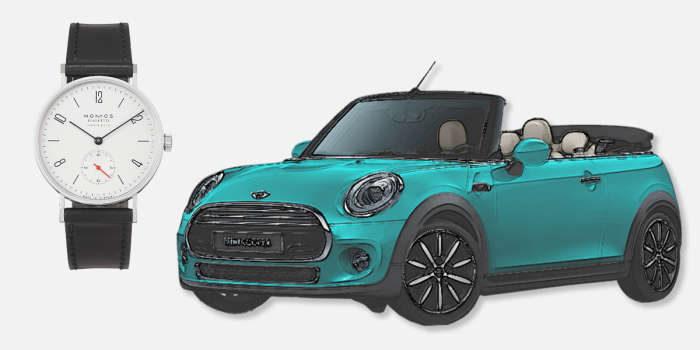
Omega Speedmaster Moonwatch Professional CO-Axial Master Chronometer and BMW 320i
Anyone who wears an Omega Speedmaster Moonwatch attaches great importance to the history of their watch. After all, the Speedmaster Moonwatch was part of the Apollo 11 programme and thus the first watch on the moon. For the Omega wearer, however, it is less important than for the Rolex wearer to impress with his watch. He feels the same way about his car. Driving characteristics are important to him, not the admiring glances of passers-by. He drives a BMW 320i in black (to match the Moonwatch). He speeds along the 95 motorway towards the Alps and curves up the Stelvio Pass, knowing that the companion on his wrist has mastered quite a few other G-forces in its history.

Patek Philippe Grandes Complications and Maserati Quattroporte
The classic Patek Philippe customer values seriousness, just like the brand itself, whose boss Thierry Stern personally approves the purchase of special pieces, such as moon phases like the PP Grandes Complications. The car that the Patek buyer drives should also radiate seriousness. A Mercedes S-Class suits him well. But since he already owns it as a company car, in which he is also driven, he likes to switch to one of his sporty companions privately. He then treats himself to a traditional brand from Switzerland's southern neighbour, which combines elegance and comfort with racy sportiness. Our guess is a Maserati Quattroporte.

A.Lange & Söhne and Mercedes 300SL Gullwing Coupé
The prestigious brand from Glashütte, whose classic is the Lange 1 with the asymmetrical dial and the Lange big date, is not coincidentally associated with the classic car event Concorso d'Eleganza on Lake Como. A. Lange & Söhne stands for great tradition, great complications, watches made of precious metals that are designed with tradition in mind: with Roman numerals and classically elegant serial inscriptions. The movements are among the most beautiful of our time; they do not appear contrived but composed.
Lange watches are popular with very successful people worldwide, including numerous company bosses from a wide range of industries. What unites them is their love of tradition. That's why many of them own classic car collections. A collector once told me he owns over a hundred classic cars and fifty watches with grand complications, including some by A. Lange & Söhne. What kind of car does someone like that drive? Well, surely there is at least one Mercedes 300SL waiting for him in a hall-like garage, preferably in the gullwing coupé version, like the one Clark Gable once drove. This is the car that the owner of an A.Lange-&-Söhne watch likes to take out on nice days, feeling part of a heritage he is helping to preserve.

Tudor Black Bay Chronograph and Alfa Romeo Giulia
Anyone who buys a Tudor watch knows that they are getting the quality awareness of its sister brand Rolex at a comparatively low price. In this respect, the brand with the aristocratic name enjoys prestige. But it is not a watch bought by people who want to appear rich, but by an upper middle class that wants to treat itself to luxury and top quality, but still keeps an eye on the price. At the same time, the Tudor fan is an individualist, one who knows his stuff, and he has a great passion for sleek, sporty design. A car that suits him is the Alfa Giulia, a saloon with a hot Italian heart and one of the most beautiful cars in the upper middle class that is talked about far too rarely.
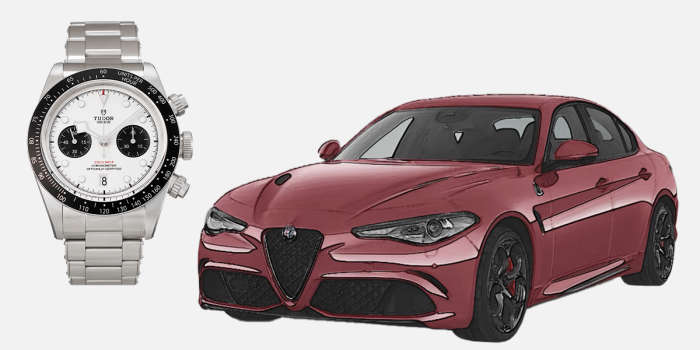
TAG Heuer and Audi TT
No question: the TAG Heuer fan loves motorsport. After all, the brand has always been associated with racing, whether as a timekeeper, as the inventor of the Heuer Carrera, named after the Carrera Panamericana car race, and the Heuer Monaco, which Steve McQueen wore on his wrist in the film "Le Mans". The Monaco Gulf Edition is, of course, best suited to the Ford GT, which scored triumphs at Le Mans with the very same logo. It was relaunched in 2018 in a Heritage Special Edition with 656 hp. Even a "normal" GT costs around 530,000 euros. Quite a lot for the fan. The TAG Heuer fan with an affinity for racing can afford an Audi TT, which is available with 197 hp from 39,000 euros and offers a lot of great design and sports car feeling for the money.
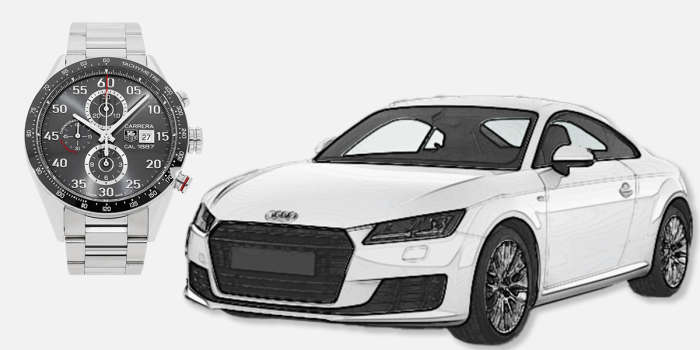
Sinn Spezialuhren and Audi A4
The buyer of Sinn Spezialuhren loves the brand's expertise in special and mission watches. Sinn was founded in 1961 by the former pilot Helmut Sinn. Today, the company is owned by the engineer Lothar Schmidt. The legacy of Helmut Sinn, who also manufactured on-board instruments for aircraft, lives on in the brand's pilot watches. Today, highly durable Sinn special watches are used by Swiss rescue pilots and on polar expeditions. One stratospheric jumper wore the Sinn 857 UTC watch on his wrist without being sponsored by the brand. He simply trusted it to work perfectly at minus 77 degrees and negative pressure. It is clear that a Sinn customer also looks for reliability when buying a car. His first glance is at the ranking in the ADAC breakdown statistics. And that's where the Audi A4 comes out on top. The mid-range saloon is the perfect car for the Sinn fan.
